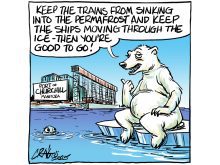Slow down
As I write this, I am sitting in a field adjacent to the Cloan grid, noting with disbelief the speed at which people drive.
This is not a revelation to me. Vehicle speed on this road has been a topic of conversation in my family for some time, but perhaps the fact that my third dog was run over Sunday night by a speeding vehicle has compelled me to write. Incidentally, any man who runs over a dog and doesn’t stop is no man at all.
Read Also

Topsy-turvy precipitation this year challenges crop predictions
Rainfall can vary dramatically over a short distance. Precipitation maps can’t catch all the deviations, but they do provide a broad perspective.
The Cloan road, although it is paved, is still a grid road, and thus the speed limit is 80 km-h. Many times, I have seen people mistake it for the Bridge City Speedway and drive by at speeds in excess of 120 km-h.
Perhaps I am especially sensitive to this, since the Cloan grid bisects my family’s farm and we are crossing it all the time on foot or with machinery, but it has simply become unsafe to perform work or leisure activities.
My mother enjoys riding her bike and has had vehicles go by her so quickly that the grass lies down flat in the ditch. People pasture their cows along this road, and calves can easily creep under the fence. Losing such an animal can mean economic loss. …
As my parents and I were kneeling on the side of the road Sunday night, trying to comfort my dog after she had been hit, a vehicle went flying by, not slowing down in the slightest.
This goes beyond inconsiderate to dangerous. My first two dogs were killed instantly. Casey will live but suffered serious injuries, and may require leg amputation.
As tragic as this was, it could have been much worse; it could have been one of the members of my family. My nephew visits frequently, and although he has been told never to cross the road by himself, things happen. When I was living in another community, one of my students was hit by a vehicle and killed.
Rural Saskatchewan works and plays alongside grid roads across this province every day. Please remember this and please slow down.
– Heather Labrecque,
Battleford, Sask.
Keep board
In Aug. 17 Open Forum, I would agree with Robert Schultz and Jean Leahy. This is a life and death issue for prairie grain farmers. The removal of the Crow Rate dealt a large blow to the economy of the prairie region of B.C., Alberta, Saskatchewan and Manitoba but not just the farm families but also the rural villages and towns.
To dismantle the Canadian Wheat Board bit by bit would deliver a death blow to the rural economy and undermine the single desk selling aspect of the CWB. It would put our rural communities back in history to the 1920-30s era when the farmers had the CWB commenced.
Why did we need the CWB? Because grain farmers on the Prairies were being given such low prices for wheat and other grains by the grain barons. These grain barons built mansions in Winnipeg. They are all along one street or area of Winnipeg for your viewing.
Grain barons lived in luxury while farmers on the Prairies lived in poverty and various forms of starvation. The CWB is a form of farm market power, which the large grain companies are just salivating at to destroy, just another step after the planned demise of the pools and farmers’ grain co-operatives.
The Conservative party is part of the picture to do the dirty work for the business concerns of wealthy companies.
Why are Mr. Chuck Strahl and Mr. Leon Benoit and other Conservative MPs so against the wheat producers who voted over 80 percent in favour of single desk selling candidates for CWB directors positions in last several CWB directors elections?…
The Conservatives may have an idea about choice, but it does not work because of the world trade situation and the powerful interests that don’t have the interests of the grain producers at heart. They only see profit margins for their companies and the weakening of the market power of farmers….
– Marilyn Thomas,
Alliance, Alta.
Organic marketing
The minister of agriculture is the person that has the knowledge and mandate to interpret federal legislation when applied to the Canadian Wheat Board.
The chief executive officer of the CWB and his staff have decided to market organic wheat and barley for approximately 60 members of Canadian Organic Certification Co-operative, a certification body in Swift Current, Sask. Minister (Chuck) Strahl may have given his endorsement to this initiative, but possibly he knew nothing of the decision made in Winnipeg. …
In any event, so much for choice promised by the Conservatives prior to their subsequent political endorsement received in the designated areas.
Giving COCC certified organic growers exclusive marketing by the CWB monopoly should have had minister Strahl say OK and now give other organic growers … export permits at no cost.
The Saskatchewan Organic Directorate speaks for Saskatchewan organic growers. Their bylaws call out farmer ownership and control. A recent organic marketing study completed by the University of Saskatchewan indicates 76 percent of organic growers interviewed would prefer the board not to become any more involved in marketing organic grains.
Will SOD, in concert with their bylaws, advise the minister accordingly?
– Bill Rees,
Stockholm, Sask.
Buying Canada
Canada is rapidly losing its economic sovereignty. Most Canadians were proud that many nations of the world viewed us as an independent peace-loving country. This is rapidly changing.
And it is happening while we are somewhat overwhelmed every day about the horrors of destruction and death in the Middle East, and as our young men are dying in support of an invasion that was not of Canada’s making.
According to the chief investment officer for Toronto-based Signature Funds, every year about five percent of Canada’s largest trading companies – there are 55 to 60 of them in operation – who do over $10 million of trade every day, are being bought up by foreign interests trying to increase their profits. Most, but not all, are American-based.
This year non-Canadian purchasers have announced the buying of 34 Canadian companies amounting to $62.3 billion.
There are some well-known names in this partial list. Hudson Bay Co., Fairmont Hotel and Resorts Inc., Dofasco Inc., Vincor International.
Falconbridge, Canada’s second largest nickel producer, was bought up by Extrata, a Swiss firm. Shareholders of Inco are facing takeovers by either American or Brazilian interests. Whistler Blackcomb mountain has agreed to sell itself to Fortress Investment Group, a New York firm.
Last year, eight companies were removed from Standard and Poors TSX Composite Index. It is estimated that this number will be greater in 2006.
The takeover of Canada has been a long-time objective of the U.S. It was accelerated under Brian Mulroney’s Conservatives, who abolished the Foreign Investments Review Agency. …
Our “hands-on” prime minister Stephen Harper certainly appears to favour the present Bush administration. There is great pressure from the U.S. to control Canada’s water and oil. On Oct. 3, 1987, Canada and the United States finalized the Free Trade Agreement. U.S. trade negotiator Clayton Yuetter made this statement: “We’ve signed a stunning new trade pact with Canada. The Canadians don’t understand what they have signed. In 20 years they will be sucked into the U.S. economy.”
Giving the Harper Conservatives a majority in the next federal election would in all probability end Canada as the country that most Canadians love and cherish.
– Leo Kurtenbach,
Cudworth, Sask.
Where democracy?
Stephen Harper was instrumental in bringing the Canadian Alliance and Progressive Conservative parties together. His reason for doing so was to create a larger, stronger party so they could win a federal election. A so-called single voice for Conservatives. On Jan. 23, they did get a minority government.
There was really no one in prime minister Harper’s party capable of being minister of agriculture but the nod went to British Columbia MP Chuck Strahl.
Harper then appointed David Anderson, MP for Cypress Hills Grasslands, as Strahl’s parliamentary secretary with responsibilities for the Canadian Wheat Board. With Mr. Anderson’s long record of bashing the CWB, it would have been hard to make a worse choice.
Now Harper and his wrecking crew want to do away with single desk selling and replace it with phony marketing choice. In the real world, this means an open market run by just five foreign companies.
The Conservatives do not want to give farmers a vote on their own marketing system. Minister Strahl says the fact they won the election gives them the right to make changes without a farmer vote. He is completely ignoring the fact that farmers consistently elect 80 percent single desk supporters to the CWB board of directors. If he goes ahead without a farmer vote, he will also be breaking the law.
Harper wanted a single stronger party in order to win an election, but now wants to weaken farmers’ bargaining power by taking away our single desk selling. Following Mr. Harper’s logic, he should have left the two parties separate so voters would have had a choice.
Agriculture minister Strahl held a meeting in Saskatoon on July 27 to determine how the so-called new CWB would operate. The only ones able to attend were the anti-CWB individuals he invited. Unwanted farmers were kept out by security guards at the door.
Is this the kind of Conservative democracy Mr. Harper bragged about before the election?
– George A. Calvin,
New Norway, Alta.
Labour pool
We (in the oil industry) are getting a little tired of taking the blame for the worker shortages. We are not exactly overstaffed here either. Most rigs do not have enough people to ensure a proper days off rotation. Some rigs cannot even operate.
Perhaps the blame for the worker shortage should go to all those responsible for destroying the small family mixed farms.
The hard work and healthy lifestyle promoted large families with good work ethics and skills.
That is where many of the successful people in this country used to come from. It was a huge trustworthy labour pool.
Those responsible will know if they merit blame be it government or business.
– Lawrence Gutek,
Hendon, Sask.
CWB protection
Should farmers give away the last bit of clout we have in marketing our grain, namely the Canadian Wheat Board?
Paul Orsak (WP, Aug. 3) tells us to get rid of the CWB and we will be more competitive. How can many sellers undercutting each other be more competitive than the CWB?
Ontario has dual marketing. This system allows buyers to wait while farmers bid the price down competing with each other. Western farmers are now averaging more for their wheat than those in Ontario.
For those who want to haul across the border to the U.S., we have noticed that if the U.S. does not like our product, whatever it is, they ignore the Free Trade Agreement and put up a roadblock.
Without the CWB, who will see that producer cars are delivered to market? Nobody, because grain companies want the grain handled through their facilities.
Farmer owned inland grain terminals have no export terminals. Companies that do will see this as an opportunity to squeeze these smaller operators out.
Why is it wrong for the CWB to operate with a monopoly, but it is acceptable for railways, oil, chemical and fertilizer companies, also labour unions?
If what they have isn’t a monopoly, I don’t know what is.
We have given away too much already, the two-price system for wheat and the Crow Rate. In return we got a lower price for wheat and higher freight costs.
The Western Canadian Wheat Growers Association lobbied for this. We have too many who want to profit from our grain. For instance the Chamber of Commerce. Why should they decide how I should sell my grain?
– T. E. Finnson,
Arborg, Man.














